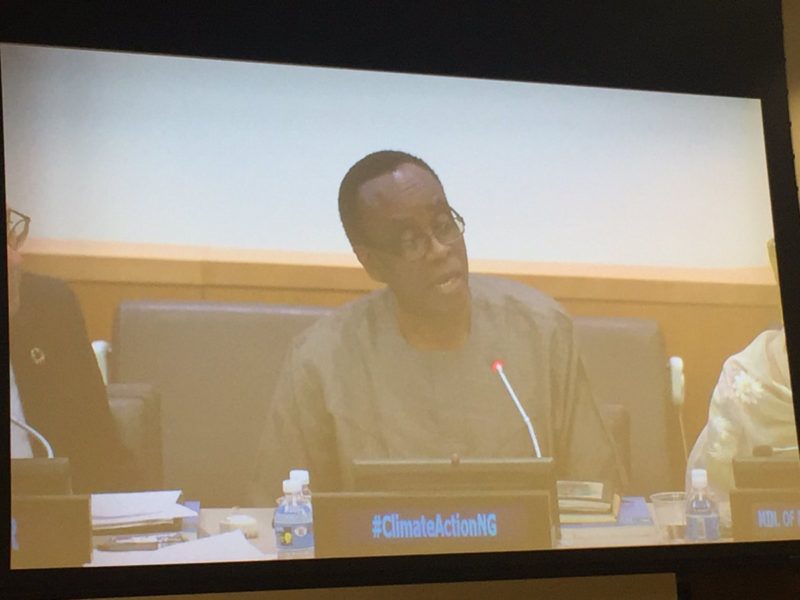Rights activist, Nnimmo Bassey, at the Nigerian side event – Taking Climate Action for Sustainable Development – on Thursday at the UNGA in New York, submits that it is time to robustly enthrone climate justice in the climate negotiations

I thank my president and the minister of environment for providing this August space to outline the strides Nigeria is making on tackling climate as well as overall environmental change.
The Niger Delta clean-up based on the UNEP Report on the Assessment of the Ogoni Environment is an excellent example of government concern for the health of the peoples and the environment as opposed to corporate focus on only profit. Coupled with the plans to end routine gas flaring, we can say that these will add up to reduce green house emissions, tackle global warming and allow the people a chance to breathe fresh air after decades of ecological despoliation. This task requires the support of the global community. Thank you Mr President.
It is good that Nigeria spent time studying the Paris Agreement before signing it. The importance of taking such steps makes deep reflections a necessity. The big questions now are with regard to the implications at a global level of contributions determined at national levels. Overall, such contributions are largely shots in the dark since they are not predicated on some scientifically allotted quantities towards meeting global emissions reduction targets.
Mechanisms should be put in place to encourage countries to urgently review their NDCs, on the basis of historical responsibility and on equitably assigned targets based on a fair sharing of the global carbon budget. The aggregate commitments currently on the table simply do not measure up to what is needed.
Currently, we see countries like ours setting targets that would see them doing more than their fair share in terms of emissions cuts – than the powerful nations that are also the most polluting whose NDCs do not generally rise to much more than 20 percent of what they ought to do.
Nigeria proposes to stop routine gas flaring, invest more on solar and other renewable energy sources. She also plans to ensure efficient resource utilisation, including through mass transit. Reforestation and “climate smart” agriculture are also on the cards. On that point we believe that what is needed are culture smart, ecologically sound agriculture devoid of genetic engineering or gene drives.
But who will fund the lofty NDCs that Nigeria has committed to? We submit that it is time to robustly enthrone climate justice in the climate negotiations. It is time to elevate the principles of common but differentiated responsibilities (CBDR) beyond being a mere notion as it now is in the Paris Agreement. It is also time to to support the vulnerable on the critical issue of loss and damage caused by climate impacts.
Permit us to repeat the crucial issue of historical responsibility. Historical responsibility cannot be denied for ever. Someone has eaten up the climate budget. I’m sure our president could characterise this as climate corruption. If someone has polluted through the years and somebody else is condemned to suffer the impacts, the call for payment of the ecological or climate debt should not be denied or delayed. This will pay for the technology and finance much needed for the transition to clean energy far more than what their national incomes could hope to do in the near term. Climate debt trumps the current Green Climate Fund (GCF) plans.
